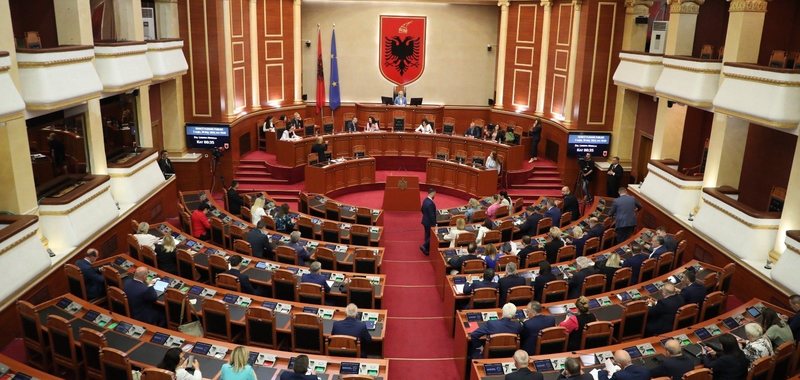Parliament with 101 MPs! What could be the impact? Analysis of the economic and institutional impact of the decision announced by the Prime Minister

Prime Minister Edi Rama proposed at the Socialist Party National Assembly on September 11 to reduce the number of MPs in the Assembly to at least 101, from the current 140. The idea was presented as part of an internal process to review the functioning of parliamentary life. Among other things, in his speech he also focused on reducing the number of MPs moving from one committee to another in order to maintain the continuity of work.
In addition to the administrative and political effect, "Scan Intel" has conducted a detailed analysis based on MPs' salaries and other benefits to understand how much of a difference this number can have in the economic, i.e. budgetary, aspect.
According to 2024 data, the average monthly expenses for MPs' benefits amount to about 20 million lek. Of this amount, about 1.2 million lek are intended for participation in committees. Meanwhile, the total average monthly expenses for 140 MPs per month amount to about 30 million lek. These are the bases on which the potential savings can be calculated in the event that the number of MPs is reduced by 39.
So, from an average of 50 million lek per month in expenses for salaries or other benefits such as telephone, rent, commissions or travel allowances; by reducing the number, about 14 million lek per month can be saved. Expressed in euros, this figure is estimated at 144 thousand euros per month.
The figures show that the savings are visible at the Assembly level but do not constitute a large difference for the total state budget. However, the decision to reduce the number of deputies should not be seen only as an economic issue. The reduction of representatives may have consequences for regional and small party representation, while each deputy remains a greater workload. On the other hand, if the new rule for committees is implemented, it could strengthen the continuity of work and also reduce costs.
In conclusion, reducing the number of deputies from 140 to 101 would save the Albanian state about 168 million lek per year or 1.7 million euros, not including other costs such as staff or infrastructure. For committees, the savings are more modest. Beyond the figures, this initiative remains more a question of balance between administrative efficiency and the need for democratic representation than a measure with a strong financial impact.

Electrification of the Tirana-Durrës-Rinas railway - EBRD opens 2-phase tender, invites companies to submit technical offers
The European Bank for Reconstruction and Development has opened a 2-phase tender for the electrification of the Tirana - Durrës railway line and the new......

First session of the 11th legislature of the Assembly - The mandate verification commission is established. Tensions from the opposition again
The 140 deputies elected in the May 11 elections addressed the Assembly this Friday, thus starting the work for the 11th legislature. The session was......

What are the first decisions of the "Rama 4" government? - From property protection, to pensions and baby bonuses
The new "Rama 4" government is expected to push forward important reforms that affect all sectors of the economy and social welfare. But what are the first......

Diella, the first minister created by AI - How does the world media react to Albania's virtual official?
Albania has attracted the attention of international media, after becoming the first country in the world to introduce a minister created with artificial......

Apartment prices are rising - Rents in North Macedonia have increased by up to 15%
In Skopje, Tetovo, Štip and Bitola, apartment rental prices are increasing significantly, especially in the central areas of these cities. The Group of Real......

The legal audit market is expanding - In 2024, the income of companies and the number of audited economic entities increased
The quality of audits has improved and the market for statutory auditors has expanded significantly in 2024. Currently, the audit market in Albania is......

Mexico, 50% tariff on Chinese products - The measure will affect over $52 billion in imports
Mexico announced it would raise tariffs on vehicles coming from China and other Asian countries to 50%. The Economy Ministry said the changes, which will......

The week ends negatively for the major currencies! – The US Dollar weakens significantly
The US dollar had a negative week closing, recording a significant drop in value from the previous day, as it was bought today at 82 lek and sold at 83.3......

















